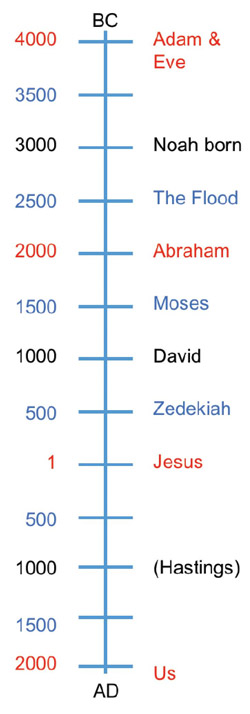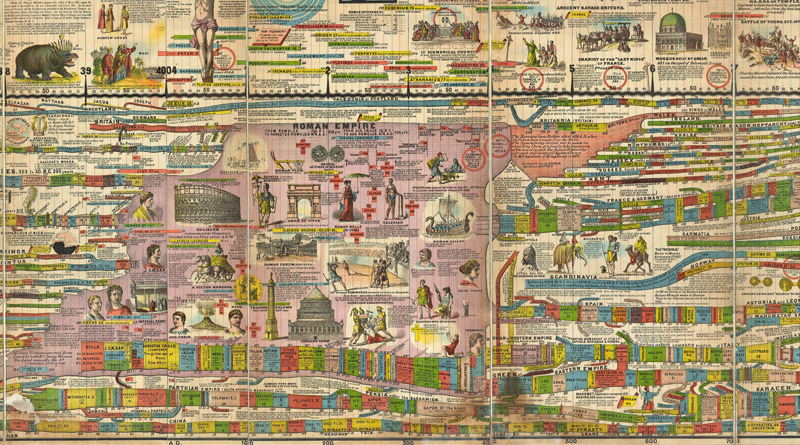Bible History – Making a Timeline
A simple way to do this is to construct a time chart for ourselves. There are several very good ones available in book shops and on the internet, but the activity of making our own really helps to cement the facts in our minds. What is more, we can add to it as we continue our Bible study.
The dates used here are rounded up or down to give whole numbers, and the Bible references show where the person is introduced. The time chart to the right has been completed following the steps below, and is colour-coded to help build it step by step.
 Step 1: 2000–year Sections
Step 1: 2000–year Sections
Start with periods of 2000 years, beginning at 4000 BC and going through to 2000 AD.
Begin with Adam and Eve (Genesis 1:27, 2:22), placing them about 4000 years before Jesus. Then measure 2000 years on from that first pair, and we arrive at 2000 BC. As we move forwards through the years before Christ, so the numbers decrease.
2000 BC gives us the time of Abraham (Genesis 11:27). He was the founder of the Jewish nation, and the rest of the Bible relates God’s dealing with the Jews, from Abraham onwards.
Moving 2000 years after Abraham brings us to the time of Jesus, and we note that there is no year ‘0’ on history, we would go from 1 BC to AD 1. Just over 2000 years after Jesus brings us to our own day.
Step 2: 1000–year Periods
Now divide each of these time periods into half, giving 1000–year gaps.
Half way between Adam and Abraham is 3000 BC, and it was about then that Noah was born (Genesis 5:29).
Mid–way from Abraham to Jesus, King David ruled over Israel (1 Samuel 16:13). He was a godly man who wrote many of the Psalms and lived in about 1000 BC.
Half way between Jesus and our time is about AD 1066, a date noted in Britain for the Battle of Hastings. As the New Testament was completed-within around a hundred years of the birth of Jesus, AD 1066 does not of course feature in the Bible.
Step 3: 500–year Groups
Finally, we have to split these periods of 1000 years into 500–year groups.
Approximately 500 years before Abraham, Noah built the ark and was saved from the Flood. It is possible to add up the years in Genesis 5, where we find that the more accurate date is about 400 years before Abraham.
Half way between Abraham and David, Moses lived (Exodus 2:10). He led the Israelites out of Egypt, and received the Law from God, which he wrote down and passed on to the people.
Then in the final segment 500 years after David, Zedekiah the last king of the southern part of Israel was taken captive into Babylon (2 Kings 25:1).
Before the Flood
To avoid confusion, it is worthwhile to note the ages of people living before the Flood. If you look at the information given in Genesis 5, you will see that people lived for much longer before the Flood than after it. This is possibly explained by there being a canopy of water surrounding the earth (Genesis 1:6–8), which filtered out many of the sun’s harmful rays. During the Flood, this water would have fallen to the earth (Genesis 7:11), so reducing the protective layer and the length of people’s lives.
Using the Time Chart
It can be interesting to keep adding to our time chart as we read our Bibles. If you plan to do this, it will be worthwhile having a larger version on a larger piece of paper, or using a notebook with each time period starting on a new page. For those with a computer, a spreadsheet is a good way to do this.
It is very useful to have a chart such as this to hand whenever we think about Bible characters. It helps us to better imagine the times in which they lived and the order in which their stories took place. Looking at the Bible in this way also reminds us that these were real people, living real lives, with a part in God’s plan. Just as we can be!


You know the Earth is 4.6 Billion years old right? No really, look into it.
Though the earth might be 4.6 billion years old, creation declares the glory of God right? No really, look into it.
Hey Marius,
I believe the earth is 4.6 billion years old, It can also be older or less. I share your belief. However, the point you should know is life was placed on the earth 6,000 years ago. I hope Christians here also see this point, the earth was void and without form means the earth was there until God added life to the planet. So the earth could very well be millions of years old but life was only present on the earth 6,000 years ago.
Thank you Roland, simple and direct to the point
Says who? Scientists who’ve been paid to lie!
If the earth is 4.6 B years old the mountains would be gone at the current rate of erosion. There would be mud at the bottom of the ocean 1000 feet deep, which there it not. Our moon’s core is still hot, it would be stone cold. They find cologne dna still alive in dinosaur bones, this would not be possible. The galaxies the find the furthest out are more complex than the closer ones, this would not be possible. I could go on and on and on.
Also, living things are far too complex for it all to be explained by evolution. It’s ridiculous! If God had not created “kinds” and it were left up to evolution, there would be a hodge-podge of living things. They would have no order and you wouldn’t be able to classify any of them. Look at the bombardier beetle. It takes chemicals inside its body to come together at the perfect moment to create a weapon to defend itself. Evolution cannot stand up to perfect order. Lastly, I ask if you’ve been over the mountains in a plane? It looks like colossal water run off. Watch the “Is Genesis History” documentary. Awesome! God is complex, intricate and beyond our true comprehension!
No is not
GOD has the power to set earth in a specific age. just like what he did to Adam and Eve. were they infants when they first drew their first breath?
Awesome Website! I don’t like to say its funny because its actually sad to me that Non believers do not accept the fact this timeline is real. If the earth is 4.6 billion years old why do we use the date 2019 today? If Christ never walked this earth why are you writing the date of today and this year. You have to believe, if you ever get the chance to come to the US check out the Creation museum. God Bless
Marius, dummy
How do you know the earth is 4.6 billion years old? Nobody can know that. Maybe its 100.2 zillion years old. Who was here 4.6 billion years ago to tell you that?
Lance, Shaun and Kevin. How, then, can Marius call on the one he has not believed in? And how can he believe in the one of whom he has not heard? And how can he hear without someone preaching to him? I wonder to myself, why would the non-believer Marius listen to the call of the one he has not believed when the messagenger proclaims his open disdain for his views. In this case, it is us – the christian, that is forgetting the story of love taught by our teacher, Jesus of Nazareth.
Thank you Matthew!
This article on writing a timeline (yes, that’s what it was about, despite the weird turn the comments here took!) is really good; it’s a fascinating exercise and you can learn a great deal about how to piece together the biblical story by doing it. A terrific exercise for kids and adults alike!
And regarding the comments …
Marius: Yes, many folks do know this. Including many Christians.
Lance: Yes, creation declares the glory of God, no matter how old it is.
Shaun: We use the date 2019 (or 2021) because it’s roughly 2019 (or 2021) years since Christ was born. Christ was not born in the first year of the earth’s existence.
Kevin: Why call Marius a dummy? There are good reasons to think the earth is about 4.6 billion years old. Whether you think the world’s age is 6000ish years, 4.6 billion-ish years, or 100.2 zillion years, no humans were there on day 1 so we’re all relying on other evidence.
Matthew: Why assume Marius is a non-believer? Many Christians are perfectly able to reconcile contemporary science with their faith and their reading of Scripture.
Who was Hastings as referenced in this timeline?
I believe “Hastings” refers to the battle of Hastings, which happened in 1066. This is a British website, so if you’re looking for a significant historical milestone around that time, Hastings will do.
Why do we believe the Roman calendar? isn’t the “Old Testament” based on the Jewish calendar? and therefore it’s truly year 5783 not 2019.
I see lots of confusion over timelines but, Roland Parsram is dead on it and very simple to understand.
People often have strong beliefs about the Bible, which can lead to arguments about its timelines. Here are a few reasons why:
Different Interpretations: Some people read the Bible literally, while others see it as symbolic. These different views can cause disagreements.
Historical and Scientific Evidence: Some try to match the Bible’s timelines with historical and scientific facts, which can sometimes clash with a literal reading.
Cultural and Religious Importance: For many, the Bible is a sacred text that guides their faith and life, making discussions about it very passionate.
Scholarly Debate: Experts often debate the historical accuracy of biblical events, leading to different opinions.
It’s important to approach these talks with respect and an open mind, as people have deeply held beliefs.
Amen
Hello, my name is Joe Simmons and I live in the US State of Texas. I was watching a youtube video discussing the lineage of Shem, Specifically the sons of Joktan. During this verbal account an absolutely Beautiful Color timeline of the Ancient Biblical World was scrolling across the screen. I immediately re-winded the video to observe the color timeline and new that I needed to find out where it came from, who produced the map and would I be able to access or purchase a high enough resolution image that I could enlarge and have professionally printed and framed for me and my Dad to be displayed in our homes.
Did you end up finding the timeline? And if so, how can I access it?